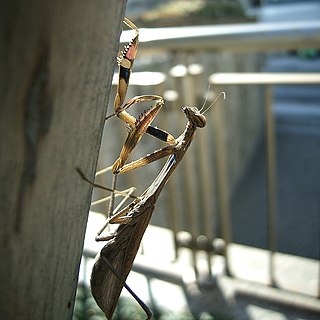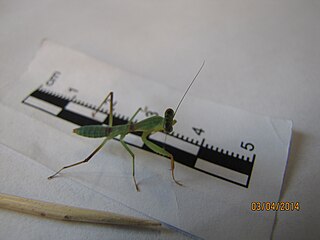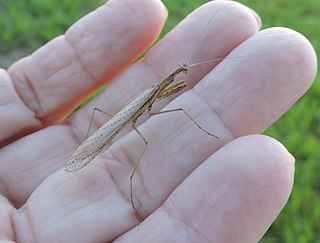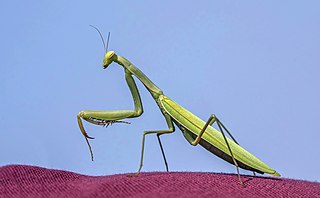| Ilomantis | |
|---|---|
| Scientific classification | |
| Kingdom: | Animalia |
| Phylum: | Arthropoda |
| Class: | Insecta |
| Order: | Mantodea |
| Family: | Nanomantidae |
| Tribe: | Nilomantini |
| Genus: | Ilomantis Saussure 1899 [1] |
Ilomantis is a genus of praying mantises.
| Ilomantis | |
|---|---|
| Scientific classification | |
| Kingdom: | Animalia |
| Phylum: | Arthropoda |
| Class: | Insecta |
| Order: | Mantodea |
| Family: | Nanomantidae |
| Tribe: | Nilomantini |
| Genus: | Ilomantis Saussure 1899 [1] |
Ilomantis is a genus of praying mantises.

Statilia maculata, common name Asian jumping mantis or "小蟷螂", ko-kamakiri or "좀사마귀", joem-sa-ma-gui, is a species of mantis native to Asia that can be found in China and Japan and Korea and Sri Lanka.

Sphodromantis gastrica, with the common names African mantis or common green mantis, is a species of praying mantis from Africa.

Rhombodera is a genus of praying mantises native to Asia and possessing common names such as shield mantis, hood mantis, and leaf mantis because of their extended, leaf-like thoraxes.

Paralygdamia madagascariensis is a species of praying mantis native to Madagascar.
Negromantis milloti is a species of praying mantis found in Madagascar.
Hierodula chinensis is a species of praying mantis in the family Mantidae.
Rhombodera brachynota is a species of praying mantises in the family Mantidae, found in Indomalaya.
Rhombodera papuana is a species of praying mantises in the family Mantidae. It is found on the island of New Guinea.
Rhombodera rollei is a species of praying mantises in the family Mantidae, found in the Maluku Islands of Indonesia.

Rhombodera valida is a species of praying mantises in the family Mantidae, found in Indomalaya.

Thespidae is a family of Neotropical insects in the order Mantodea. Following a major revision of this order in 2019, the old-world subfamilies Haaniinae and Hoplocoryphinae, previously placed here, have been upgraded to family level.

Mantises are an order (Mantodea) of insects that contains over 2,400 species in about 460 genera in 33 families. The largest family is the Mantidae ("mantids"). Mantises are distributed worldwide in temperate and tropical habitats. They have triangular heads with bulging eyes supported on flexible necks. Their elongated bodies may or may not have wings, but all Mantodea have forelegs that are greatly enlarged and adapted for catching and gripping prey; their upright posture, while remaining stationary with forearms folded, has led to the common name praying mantis.

Stenophylla is a genus of praying mantis in the subfamily Stenophyllinae, which is now placed in the family Acanthopidae. It the sole genus of the tribe Stenophyllini.

Tenodera aridifolia is a species of mantis in the subfamily Mantinae. The Chinese mantis, T. sinensis, was once considered to be a subspecies of T. aridifolia, but the species can be distinguished by the shape of male genitalia.
Ilomantis ginsburgae is a species of leaf-dwelling praying mantis from Madagascar. It is the first praying mantis species characterised by its female genitalia. It was named after United States Supreme Court Justice Ruth Bader Ginsburg for her "commitment to women's rights and gender equality" and for her custom of wearing a jabot, a frilly neckwear which resembles the insect's neck plate.

Galinthiadidae is a family of 24 African mantis species in four genera.

Harpagomantis is a genus of praying mantises in the family Galinthiadidae found in Africa. It is monotypic, being represented by the single species Harpagomantis tricolor.

Acontistini is a tribe of neotropical mantids in the superfamily Acanthopoidea, and family Acanthopidae. There are 7 genera and more than 30 described species in Acontistini. In 2016, several genera were moved from Acanthopidae to a newly created family Acontistidae, but this has not been accepted in most recent classifications.
Thespinae is a subfamily of mantids in the family Thespidae. There are 16 genera and at least 40 described species: found in Australasia, Central and South America.

Polyspilota is a genus of praying mantises in the family Mantidae. Species of the genus are native to Africa.